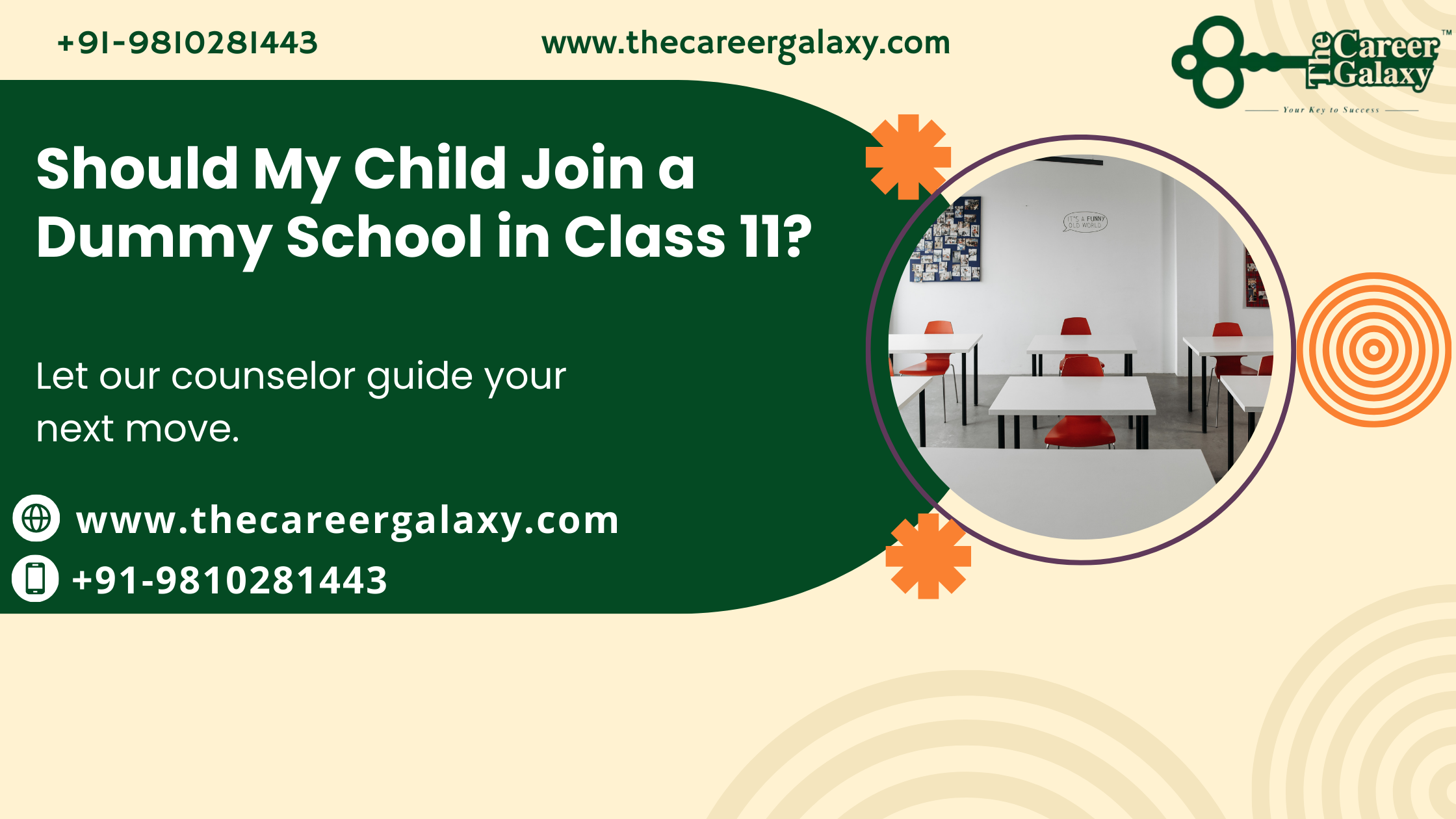
Should My Child Join a Dummy School in Class 11?
Should My Child Join a Dummy School in Class 11?
Choosing the right schooling environment is a critical decision for both students and parents, especially during Class 11. For many, this is the turning point toward a career path, requiring intensive focus and preparation. One option that often arises is enrolling in a dummy school.
If you’re hearing about dummy schools for the first time or are unsure if they’re the right step for your child, this blog provides all the answers. From understanding what a dummy school is to weighing the pros and cons, we’ll guide you in making an informed choice.
What is a Dummy School?
A dummy school, often referred to in discussions surrounding “dummy admission meaning,” is a school where students enroll but don’t attend regular classes. Instead, they focus on preparing for competitive exams such as JEE, NEET, or other entrance tests. These schools collaborate with coaching centers, allowing students to bypass traditional schooling practices like daily attendance and classroom learning.
This setup is intended to provide students with the flexibility to dedicate more time to exam-specific coaching. However, the concept raises concerns about “educational malpractice,” “school attendance fraud,” and other irregularities associated with “student enrollment.”
Key Characteristics of Dummy Schools:
- Attendance Flexibility: Students are marked present but don’t physically attend classes.
- Focus on Coaching: Coaching institutes handle teaching, often in subjects relevant to competitive exams.
- Minimal Academic Activities: Schools limit extracurriculars, practicals, or comprehensive assessments.
- Collaboration with Private Schools: Many dummy schools partner with private institutions.
Why is Class 11 a Crucial Stage?
Class 11 is often described as the foundation year for ambitious students preparing for careers in engineering, medicine, or other professional fields. The academic syllabus sets the groundwork for competitive exams taken after Class 12. Here’s why this year matters:
- Syllabus Importance: Topics introduced in Class 11 are often integral to Class 12 board exams and entrance tests. Strong conceptual understanding is essential.
- Skill Development: Students build critical problem-solving, analytical, and time-management skills.
- Career Decisions: This is the time when students narrow down career options, making significant academic choices.
Given its importance, the right learning environment plays a significant role. This is where the debate between traditional schools and dummy schools arises.
The Role of a Career Coach
If you’re unsure how to approach this decision, consulting a career coach can be a game-changer. Career coaches help students assess their goals, strengths, and interests while aligning these with the right academic paths. Services like creating personalized study plans, identifying career goals, and even support for mental well-being are part of the guidance provided.
Benefits of a Career Coach:
- Clarity in career and academic choices
- Focus on aligning long-term goals with current preparations
- Guidance on balancing school, coaching, and extracurriculars
- Support for managing stress and expectations during competitive exam prep
Pros and Cons of Joining a Dummy School
Like any decision, joining a dummy school comes with its advantages and disadvantages. Here’s a detailed breakdown to help you weigh your options:
Pros:
- Reduced Time Pressures:
Students don’t have to juggle school and coaching schedules since most coaching centers take over academic instruction.
- Focused Exam Preparation:
Freedom from daily school activities allows students more time to focus on specific subjects and competitive exams.
- Flexibility for Self-Study:
Without regular school hours, students can customize their study plans and allocate time as needed.
Cons:
- Lack of Holistic Education:
Dummy schools often exclude extracurricular and life-skills-based activities, which are crucial for overall growth.
- Dependence on Coaching Centers:
Since teaching is outsourced, the quality of education depends heavily on the coaching institute.
- Social Isolation:
Students miss out on interactions with peers, school events, and an active school environment, which may hinder their social development.
- Compliance and Risks:
Issues like “school attendance fraud” and confusion around “CBSE dummy admissions” raise ethical questions about such setups.
Factors to Consider Before Deciding
Making a decision requires careful consideration of the following aspects:
Academic Goals
- Is your child focused on specific exams like NEET or JEE?
- Does their syllabus demand extra coaching outside school?
Learning Style
- Does your child thrive in structured school environments or independent learning setups?
Long-Term Impact
- How will skipping regular schooling affect their interpersonal and social skills?
- Will they adapt well to college environments, which demand an all-rounded approach?
Quality of Coaching
- Is the coaching center associated with the dummy school reputed and trustworthy?
- Does it align with your child’s learning needs?
Ethical and Legal Considerations
- Ensure the school meets “private school regulations” to avoid complications.
- Confirm the admission is done transparently and ethically.
Should You Choose a Dummy School?
The decision will depend on your child’s specific goals, learning preferences, and career aspirations. A dummy school may suit students who are laser-focused on competitive exams and thrive in self-directed environments. On the other hand, traditional schooling offers a broader framework for holistic development.
Summary Table
| Factor | Dummy School | Traditional School |
|---|---|---|
| Focus | Competitive exam preparation | Board exams + overall learning |
| Flexibility | High | Moderate |
| Holistic Growth | Limited | Comprehensive |
| Social Interaction | Minimal | Extensive |
| Dependence | Coaching Centers | School + Self-Study |
The Final Decision is Yours
As a parent or student, this choice is personal and significant. Consider your goals and evaluate each factor carefully. No matter your decision, prioritize your child’s emotional well-being and long-term potential.
For more personalized guidance, book a session with our career coaches. Begin the conversation today to shape a fulfilling future for your child.
